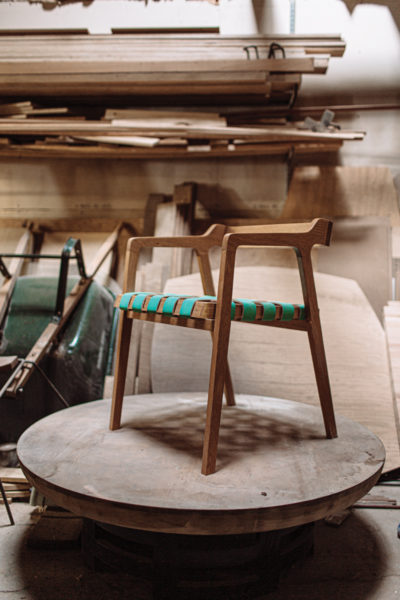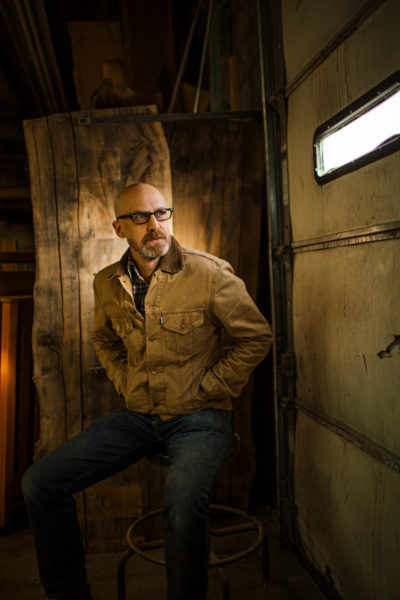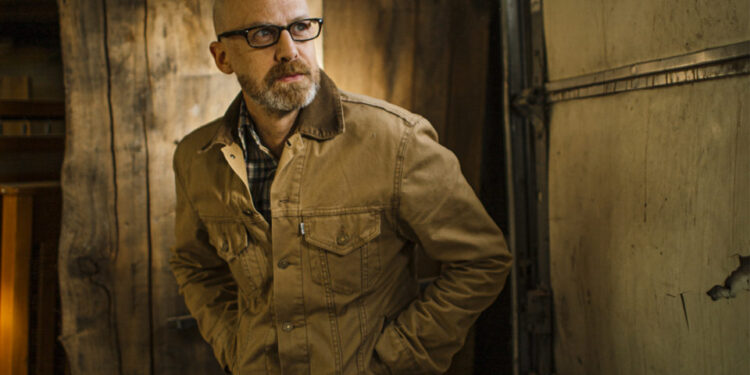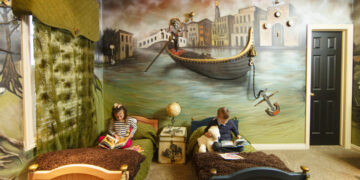“I hate being contricted. I love being free,” said Omahan Jeremy Estill. Estill designs furniture for Roost Midwest Modern as a side gig out of downtown public wood-working shop Bench. He approaches the wood like a dancer, light and centered; his hazel eyes, hidden behind his horned-rimmed tortoise shell Ray-Ban glasses, seemingly transported while he works. He isn’t afraid to get dirty and doesn’t even think about donning an apron.
Big red headphones block all sound due to his hyperacusis, or sensitivity to sound. Instead, Estill feels the vibrations of the wood, smells it, and tastes the sawdust that covers him in his open workspace. He will soon be moving into a private work space at Bench, complete with a gallery wall.
“[Estill’s] work is incredibly creative,” Bench owner Ben Petersen said. “He sees ways of solving problems I would never think of, very adaptive, a lot more of an organic style than I do when woodworking.”
Artist. Actor. Baker. Estill, 49, has many talented tools in his metaphorical belt.
But most mornings, Estill throws on a plain pocket t-shirt, a pair of sturdy jeans, and his brown Red Wing boots (If it’s cold, he adds a warm flannel and a tan heavy-duty jacket) and, after downing a cup of black coffee, heads to work at D Kiser Design Construct Inc.
Estill’s regular day job is constructing interior components for houses, such as cutting out parts for kitchen cabinets. He is meticulous about the smallest details, even matching the veneer. The end result is a cohesive, dramatic look.
Estill realized the perks of a steady income and hours when he joined the building contractor team last spring. Plus, the job gave him the opportunity to learn about remodeling houses.
The task of running his furniture business full-time wore him down, much like his beat-up work boots.
“I was incredibly happy or incredibly miserable in the same day,” Estill recalled. “I’ve never been afraid to shift gears and try something. Just picking one thing I had to do the rest of my life never really appealed to me.”
Originally from Amelia, Nebraska, Estill studied theater at Hastings College for a time. (He still enjoys acting and theater-goers can occasionally catch him performing at Omaha Community Playhouse and other Omaha venues.) He also worked for more than a decade as a European-style bread and pastry chef in Asheville, N.C., and Little Rock, Arkansas.
In 2006, the then-baker/chef decided to venture into new territory again and enrolled in furniture design classes at the University of Arkansas at Little Rock. The hands-on, immersive experience spoke to him. He didn’t graduate, preferring to apprentice with a furniture designer in Arkansas. When he moved to Omaha in 2013, he branched out on his own at Bench.
r r
r
A clean, minimalist look with a simple block coloring scheme from the Great Depression era is seen in his furniture pieces. The Farmhouse style also informs many of his works. The nostalgia of rural Nebraska and ranch life blend together with contemporary touches.
Estill credits his grandfather, who made everything from boots to tractors to fences, with having the biggest impact on him.
“It’s what makes me hands-on, a desire to know how things work, and in some ways, working backwards,” he said.
Furniture making isn’t only about designing four sides and a lid, Estill said. He finds a way to make designs flourish, adding unique details such as a soft leather loop instead of a rigid knob. One blue drawer rather than just a simple, solid color. He believes pieces should also reflect the history and background of a craftsman. The woodworker puts a slice of his soul into each work.
It’s also about considering how it fits a customer’s personal needs. Estill recalled building a dining room table for the Grunkemeyers, who needed more leg space since many family members are over six feet tall. He constructed a minimal steel base, allowing ample room under the broad tabletop for those long limbs.
“He is very thoughtful, a great listener. He brings ideas to the table, but doesn’t force his ideas onto you,” Heidi Grunkemeyer said.
Estill believes nothing is off limits when it comes to his creative side. He rarely shies away from using interesting materials. Human hair and rebar make a perfect bonding agent for a concrete coffee table, he said.
“He doesn’t draw hard lines between being an artist and being a craft person. He straddles that line really well. He keeps both worlds,” Petersen explained.
Estill shares his methods and approach, teaching an Introduction to Woodworking class once a month at Bench. His advice for do-it-yourself newcomers is simple: “You have to have it somewhere within you to not be afraid of your mistakes. Just try it and if you don’t like it, hire someone like me to do it for you,” Estill said with a laugh.
r
View Estill’s work at roostmidwestmodern.com.
rThis article was printed in the January/February 2020 edition of OmahaHome. To receive the magazine, click here to subscribe.














